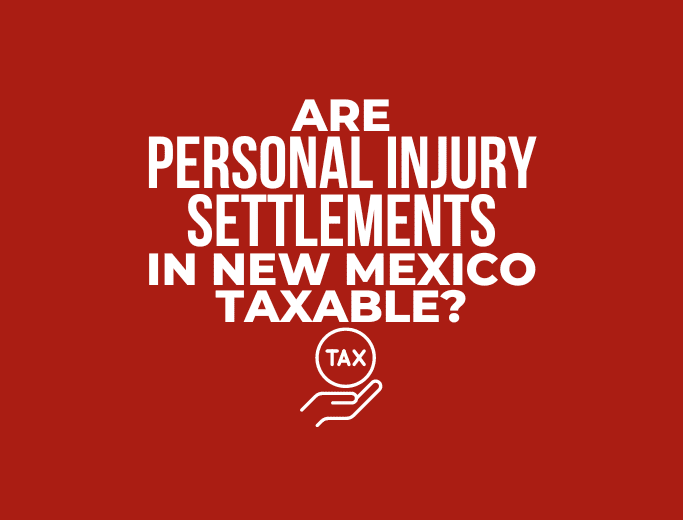Are Personal Injury Settlements Taxable In New Mexico?

After securing a settlement for a personal injury or considering the pursuit of a personal injury claim in New Mexico, a commonly raised inquiry that our Albuquerque personal injury lawyers address involves concerns about potential tax implications from personal injury settlements.
Understanding tax implications becomes essential when receiving settlement funds after a personal injury claim. Fortunately, the good news is that the proceeds from your injury settlement are typically not subject to taxation by either the state of New Mexico or the federal government. However, exceptions may apply depending on various factors, including the types of damages you recover, how the settlement is structured by your personal injury attorney, and other considerations under New Mexico law.
Types of personal injury settlement damages a victim can recover in New Mexico
To grasp the full scope of potential taxable elements after a personal injury settlement, let’s start by exploring the damages that a personal injury victim may seek for recovery in Albuquerque and across New Mexico.
In New Mexico, individuals can seek compensation for personal injury damages caused by a negligent party. Damages refer to the losses or harm suffered by the victim due to the negligence, and they are awarded as monetary compensation. To put it plainly, the settlement money obtained by a successful claim represents the agreed-upon financial sum designated to address the damages and bring resolution to the dispute. Once both parties agree on the amount, a settlement is reached, and the claim is resolved.
A person who sustains injuries due to someone else’s negligence in New Mexico has the option to pursue damages, which fall into two primary categories: economic damages and non-economic damages. These compensatory damages aim to restore the victim to their pre-harm condition and serve to “make the plaintiff whole” again.
Economic Damages
Consider economic damages as expenses you can connect to a bill or receipt. These are measurable financial losses and include:
- Lost wages
- Medical expenses (including future medical expenses related to the injury)
- Property damage
- Reduced earning capacity
Each of these items has a clear dollar amount linked to it, and the plaintiff can provide direct evidence to prove the expense or loss.
Non-Economic Damages
Non-economic damages are intangible, meaning they are subjective. These encompass the emotional, psychological, and physical tolls a victim experiences due to someone else’s negligence. Non-economic damages may include:
- Pain and suffering
- Emotional distress
- Scarring or disfigurement
- Loss of enjoyment of life
These damages are often undervalued by insurance companies, and assessing non-economic damages should be left to the experience of a personal injury attorney to negotiate a fair value.
Punitive damages
Punitive damages, also known as exemplary damages, are usually decided and granted during a trial rather than a settlement agreement. Unlike compensatory damages, punitive damages do not aim to compensate the victim. Instead, their primary purpose is to penalize the defendant for reckless behavior, serving as a deterrent against future engagement in such conduct.
Now that you’ve got a handle on the kinds of damages you can get in a personal injury settlement in New Mexico, let’s dive into taxes.
Why most personal injury settlements in New Mexico are not taxable
The simple reason why the majority of personal injury settlements aren’t taxable is because settlements are not classified as income.
The tax system operates on the principle of taxing gains. For instance, capital gains, such as selling a house or other investments for a profit, are considered taxable income. Your regular income, like salaries and wages, is also taxable, subject to federal and New Mexico state taxes.
As mentioned earlier, compensatory damages from a personal injury settlement are designed to make up for a loss. When you receive compensation for a loss, it isn’t treated as income but rather as a way to “make you whole” again, addressing the harm caused by the negligent party.
Due to the fact that most aspects of a personal injury settlement are not categorized as gains, they typically fall under an exemption from both New Mexico state and federal taxes.
Personal injury settlements that are not taxable
Per IRS code “26 USC 104: Compensation for Injuries or Sickness,” non-punitive damages obtained in personal injury settlements are excluded from gross income, regardless of whether they are received as a lump sum or through staged settlement payments (smaller payments over a period of time).
Non-taxable damages recovered in a personal injury settlement include:
- Physical injuries or physical sickness
- Emotional distress or mental anguish
- Medical expenses and medical bills
- Pain and suffering
- Property damage
Let’s explore each of these aspects to ensure you have a clear understanding of their implications on taxes, including some exceptions you might need to consider depending on your unique situation.
Personal physical injuries or physical sickness
If you obtain a settlement for personal physical injuries or physical sickness, characterized as “observable, bodily harm,” the entire sum is exempt from taxes, provided you did not claim an itemized deduction for medical expenses related to the injury or sickness in previous years.
If you previously obtained a tax advantage by declaring the same medical expenses for which you received compensation in your insurance settlement, the claimed amount would be subject to taxation. For instance, suppose you were the injured party in a car accident in 2020, and you itemized those medical deductions on your tax return each year. If your car accident lawyer in Albuquerque secures a settlement on your behalf in 2024, you will be liable for paying taxes on the medical expenses deducted in the preceding three years.
This principle applies to most case types and injury settlements handled by a personal injury attorney in Albuquerque at our firm, not limited to car accident cases.
Emotional distress or mental anguish
The financial compensation you receive for emotional distress or mental anguish is not considered taxable income and is treated similarly to settlements for physical injuries. It’s important to note that the emotional distress or mental anguish must be related to the physical injury or sickness.
An instance where compensation for emotional distress or mental anguish is not tied to a physical injury or sickness might be a defamation case. For example, if someone spreads false and damaging statements about you, causing considerable emotional distress without resulting in any physical harm or sickness, any monetary damages awarded as compensation for emotional distress in a legal settlement or judgment would be deemed unrelated to a personal physical injury or sickness and, consequently, taxable income.
Medical expenses and medical bills
Compensation received for medical expenses is not subject to taxation. This includes past, present, and future medical bills related to the injury. Examples of such expenses include emergency medical bills, doctor care, medical devices, prescriptions, surgeries, lab work, or physical therapy, among others.
The exception to this rule applies if you previously claimed these expenses as deductions on your taxes. In such a scenario, the compensation you receive may be taxable, limited to the extent of the deductions you previously took.
Pain and suffering
Payment for pain and suffering in a personal injury settlement remains non-taxable in both New Mexico and at the federal level. This exemption from taxes is especially advantageous, particularly given the potentially substantial dollar amounts awarded.
Property damage
If you receive a settlement for the decrease in your property’s value, and the settlement amount is less than the adjusted basis of your property (which includes the original cost plus any improvements or minus depreciation), it is not taxable. Additionally, you generally don’t need to report such settlements on your tax return because they are non-taxable.
Consider your motorcycle, bought for $15,000, which suffered collision damage. You spent $2,500 on repairs to restore its condition. The adjusted basis of your motorcycle is now $17,500 ($15,000 + $2,500). Your motorcycle accident lawyer obtained a settlement for the decrease in the motorcycle’s value due to the accident, let’s say $14,000. Since this amount is less than the adjusted basis ($17,500), it remains non-taxable.
Personal injury settlements that are taxed in New Mexico
Some personal injury settlement money you recover may be taxed in New Mexico and on the federal level.
What is taxable in a personal injury settlement can include:
- Lost wages and future lost wages
- Punitive damages
- Interest on a delayed personal injury settlement payment
Lost income
Taxable damages in a personal injury settlement include lost wages. This is because they are considered a replacement for the income you would have earned if you hadn’t been injured. Just as you would be required to pay taxes on the wages earned while working, the settlement money you recover for lost wages is also taxable. Since lost wages are categorized as economic damages, the calculation of this amount is relatively straightforward and allows for little interpretation.
Punitive damages
Punitive damages are granted to penalize an individual for gross negligence, a reckless disregard for public safety, or intentional acts leading to personal injury. In such instances, a judge may compel the negligent party to pay punitive damages. As these damages aim to punish the defendant rather than “make the victim whole again,” they are typically taxable. Reporting punitive damages as “other income” on your tax return is necessary.
Interest on personal injury settlement
If you experience a delay in receiving the full personal injury settlement amount, interest may be added to compensate for the time it was unpaid. This interest is calculated on the outstanding balance over time.
Because this additional income goes beyond “making you whole again”, it is taxable.
How do I reduce personal injury settlement taxes?
An Albuquerque injury lawyer can help you reduce the tax implications of a personal injury settlement in a number of ways.
- Properly allocating the settlement money into taxable and non-taxable categories can ensure that you pay taxes only on what you are required to.
- A personal injury attorney can help structure your settlement in a way that provides a steady income stream over time, rather than receiving a payment in one lump sum.
- An experienced injury law firm can help with settlements awarded to minors by helping parents of minors understand the benefits of long-term structured annuities, which will protect the funds over time.
Let an experienced personal injury attorney in New Mexico get you the settlement you deserve
A New Mexico injury lawyer can assist you in obtaining damages for personal injury cases, provide guidance on what may be taxable, and work towards minimizing your taxes by ensuring accurate classification and categorization of the compensation you receive.
Since the majority of personal injury settlements are non-taxable, consulting with an experienced personal injury attorney before settling with the insurance company is always advantageous to ensure you recover the maximum possible amount.
If you’ve been injured, call us today for a free consultation.
Call now
505-898-2355
Ring the Bell
Why Choose Ron Bell Injury Lawyers?
We Get Results!
